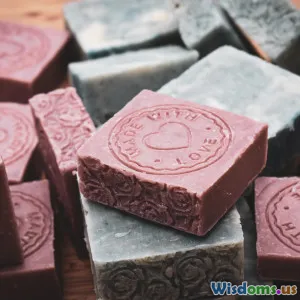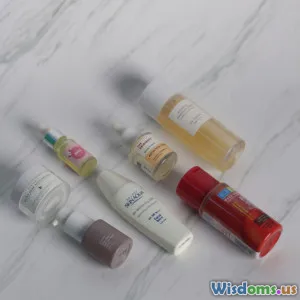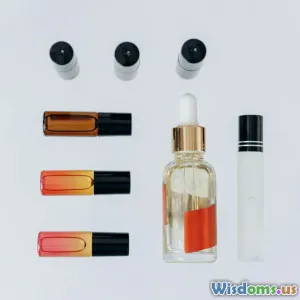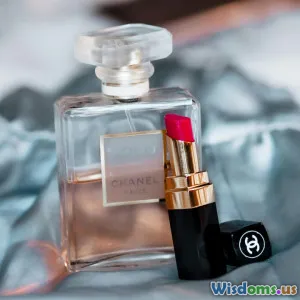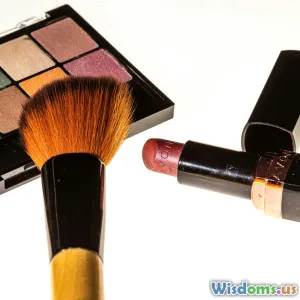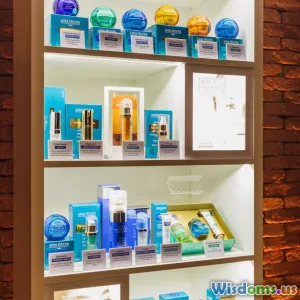
Will Plant Based Serums Replace Conventional Moisturizers Soon
11 min read Explore the rise of plant-based serums and their potential to transform skincare by replacing traditional moisturizers with natural, effective alternatives. (0 Reviews)
Will Plant-Based Serums Replace Conventional Moisturizers Soon?
Introduction
In recent years, the skincare industry has witnessed a dramatic shift towards natural and sustainable ingredients. Among the many promising trends, plant-based serums have captured significant attention for their potent blend of botanical extracts, antioxidants, and hydrating components. The question arises: could these powerful serums replace conventional moisturizers soon? This topic isn’t just a passing fad—it digs deep into how skincare is evolving with consumer preferences, scientific advancements, and environmental considerations.
In this comprehensive article, we dissect the role of plant-based serums, compare their efficacy against traditional moisturizers, and explore real-world insights to answer this live-in-the-moment question. Whether you're a skincare aficionado or curious about clean beauty innovations, this analysis will offer you detailed, practical, and enlightening perspectives.
Understanding Plant-Based Serums and Conventional Moisturizers
What Are Plant-Based Serums?
Plant-based serums are concentrated skincare products formulated primarily from botanical ingredients such as plant oils, extracts, and antioxidants. Unlike typical creams, serums usually feature a lightweight texture designed to penetrate deeply into the skin for targeted effects—hydratation, brightening, anti-aging, or soothing. Some common botanicals found in these serums include:
- Aloe Vera: Known for cooling and soothing irritated skin.
- Green Tea Extract: A rich antioxidant that fights oxidative stress.
- Rosehip Oil: High in vitamin C and essential fatty acids.
- Chamomile: Anti-inflammatory and calming properties.
What Defines Conventional Moisturizers?
Conventional moisturizers generally have a creamy or lotion-like texture, focusing primarily on locking moisture into the skin surface and reinforcing the skin's barrier. Their ingredients often feature emollients like petrolatum, mineral oils, and synthetic humectants, alongside occlusive agents which help prevent trans-epidermal water loss. Such moisturizers serve to hydrate while creating a protective layer—a crucial component for skin suffering from dryness or environmental damage.
Differences in Function and Formulation
While serums absorb quickly and deliver active ingredients deep within the skin, moisturizers provide a protective shield and prolonged hydration by remaining closer to the skin surface. Conventional moisturizers tend to contain a mixture of synthetic and natural compounds aimed more at barrier protection, whereas plant-based serums emphasize intensive nourishment and correcting specific skin issues.
The Rising Popularity of Plant-Based Serums
Scientific and Consumer Drivers
Consumers today are increasingly wary of chemical additives, synthetic fragrances, and questionable preservatives found in many traditional moisturizers. According to a 2023 survey by the International Botanical Skincare Association, over 67% of skincare buyers now prefer plant-derived, cruelty-free, and eco-friendly products.
Simultaneously, research into herbal actives has expanded, proving their efficacy through high-concentration extracts and advanced delivery systems. For instance:
- A 2022 study published in the Journal of Dermatology highlighted that serums containing green tea polyphenols can reduce inflammatory markers in acne-prone skin by up to 30% in 8 weeks.
- Another trial demonstrated Rosehip oil's vitamin C content stimulates collagen production, improving elasticity comparably to some synthetic retinoids but with fewer side effects.
These findings boost confidence in plant-based formulations.
Market Growth and Innovation
The clean beauty market angle amplifies the prominence of plant-based serums. Brands like Herbivore, Tata Harper, and Drunk Elephant report double-digit annual growth specifically with their botanical serums segment. Innovations such as combining adaptogenic herbs (ashwagandha, ginseng) and fermented botanical ingredients enhance potency and skin compatibility.
These advances drive consumers to reconsider moisturizers in favor of multi-functional serums that offer nourishment and subtle hydration.
Advantages of Plant-Based Serums over Conventional Moisturizers
Potency and Targeted Action
Serums are designed to penetrate deeply, delivering highly concentrated active ingredients that traditional moisturizers can’t match. For problem areas—like pigmentation, fine lines, or inflammation—plant-based serums often deliver better outcomes due to their potent phytochemicals and antioxidants.
Lightweight Texture for Diverse Skin Types
Unlike heavy creams, serums typically have a lightweight, non-greasy feel making them ideal for oily and combination skin types who often avoid occlusive moisturizers. During hot, humid summers, serums like calendula or chamomile-based formulas provide moisture without clogging pores.
Sustainability and Ethical Practices
Plant-based serums frequently use sustainably sourced ingredients and eco-conscious packaging. Consumers are increasingly aligning with brands that promote transparency, organic farming, and cruelty-free testing. In contrast, some conventional moisturizers face criticism for petroleum-based derivatives and synthetic preservatives with environmental impact.
Secondary Benefits
Certain botanical extracts have dual roles—as skincare actives and mood enhancers. Aromatherapeutic ingredients like lavender or neroli deliver calming effects, turning serums into holistic beauty rituals.
Challenges and Limitations
Hydration and Occlusiveness
One key limitation of most plant-based serums is their inability to provide intensive, long-lasting occlusion or moisture locking, a domain where traditional moisturizers excel. Especially for very dry or sensitive skin, serums alone might not prevent transepidermal water loss effectively.
Stability and Shelf Life
Botanical ingredients are particularly vulnerable to oxidation and degradation when exposed to light and air. While antioxidants sometimes stabilize formulas, serums may have shorter shelf lives requiring preservatives—often a balance struggle for clean beauty brands.
Cost Factors
High-quality botanical extracts and organic certifications increase production costs. Plant-based serums tend to be pricier than many dermatologically tested conventional moisturizers, potentially limiting accessibility.
Expert Insights: A Balanced Perspective
Dr. Elena Martinez, a renowned dermatologist specializing in integrative skincare, shares:
_"Plant-based serums have carved a strong place because they bring real bioactive benefits without harsh irritants. However, they should not fully replace traditional moisturizers for those with chronic dryness or compromised skin barriers. Instead, a complementary approach is more effective."
Similarly, Sarah Klein, founder of a leading botanical skincare brand, emphasizes:
_"Innovation in plant-based serums has allowed us to customize treatments. We often combine serums with lightweight moisturizers providing hydration and barrier support, especially in colder months."
This expert consensus supports a hybrid skincare regimen rather than an outright replacement in the near term.
Consumer Experiences and Trends
Real-World Usage
Consumers are increasingly incorporating plant-based serums as standalone products or layering them with moisturizers. A 2023 survey by SkinSense revealed 47% of users who adopted serums reported enhanced skin texture and radiance within two weeks, yet 55% continued using moisturizers for hydration.
Instagram and Influencer Trends
Social media platforms have accelerated the adoption curve through influencers who vouch for natural serums' transformative effects. Viral brands such as The Ordinary and Biossance highlight plant-based serums, communicating simplicity and transparency.
Potential for Disruption
If research progresses to address hydration barriers while maintaining natural purity and affordability, plant-based serums hold strong disruptive potential. For now, many consumers treat them as advanced skincare supplements rather than complete substitutes.
Future Outlook: What’s Next for Skincare?
As cosmetic scientists unlock new extraction techniques, stabilization methods, and botanical synergies, plant-based serums will grow more versatile and effective. Emerging technologies like nanotechnology and bio-fermentation enhance ingredient delivery and longevity.
Simultaneously, regulatory frameworks and sustainability pressures encourage cleaner ingredient lists and better transparency.
We may witness formulas that merge deep hydration, nourishment, and barrier protection—ultimately bridging the gap with moisturizers. Until then, combining serums with suitable moisturizers remains a best practice.
Conclusion
The question "Will plant-based serums replace conventional moisturizers soon?" invites a nuanced answer. Plant-based serums unquestionably revolutionize skincare with their concentrated botanicals, lightweight textures, and natural appeal. Their scientifically backed efficacy and consumer demand signify a compelling future in the beauty landscape.
However, owing to hydration mechanics, protection needs, stability issues, and cost, serums are unlikely to fully replace conventional moisturizers in the immediate future. Instead, they complement well, creating hybrid routines customized to individual skin types and goals.
For skin enthusiasts, the best approach is to embrace innovation, balance nature with science, and recognize that the skincare evolution is less about replacement and more about integrated improvement. With ongoing breakthroughs, plant-based serums may well become the cornerstone of next-generation skincare.
Takeaway: If you seek potent active ingredients, environmental responsibility, and elegant, lightweight formulas, plant-based serums offer an exciting horizon. But for enduring hydration and barrier reinforcement, pairing them thoughtfully with moisturizers unlocks your skin’s true potential.
References and Studies:
- Journal of Dermatology, Green Tea Polyphenols Study, 2022
- International Botanical Skincare Association Consumer Survey, 2023
- SkinSense Survey on Serum Usage, 2023
- Expert Interviews, Dr. Elena Martinez & Sarah Klein, 2024
Rate the Post
User Reviews
Popular Posts











